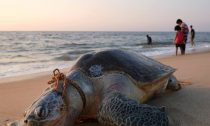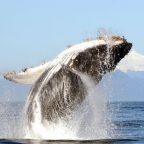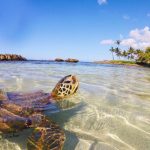
The oceans are facing a perfect storm of threats that will destroy marine life unless the government takes urgent action, a new report has warned. Plastic pollution, climate change, and overfishing are combining to put sea creatures under intolerable stress, according to MPs on the Environmental Audit Committee.
The report, Sustainable Seas, says the UK government treats the oceans as “out of sight, out of mind” and must lead an international effort to stop the catastrophic impact of human activity.
Committee chair Mary Creagh MP told Sky News: “We only have one ocean and our children deserve to experience it in all its wonders, and to be able to see the coral reefs going into the future.
“But the ocean is under threat as never before from climate change, which is warming it, acidifying it, and deoxygenating it.
“It’s under threat from overfishing and it’s under threat from pollution.
“We’re pouring sewage and chemicals and plastics into our ocean. We’ve just got to stop treating it like a sewer.”
Sky was asked to give evidence to the committee because of its Ocean Rescue campaign that has focused on plastic and marine protection.
In its report the committee urges the government to be more ambitious in tackling the scourge of plastic.
It wants a deposit scheme on plastic bottles to start earlier than the current plan of 2023 and it renewed its call for a latte levy on disposable coffee cups, a measure the government has so far rejected.
Will McCallum, head of oceans at Greenpeace UK, said: “Reducing how much plastic we use in the first place will be vital, as well as banning problem plastics and introducing a plastic bottle return scheme as soon as possible.
“The oceans are our life support system. The committee has produced truly ground-breaking recommendations for sustainable seas and we urge the government to act without delay.”
The committee says the government is failing to properly to protect marine life in UK waters.
Although it claims to have set aside 20% of our seas as conservation zones, the most damaging form of fishing – trawling the sea bottom with spikes and chains – is banned in just 2%.
Jean-Luc Solandt a scientist at the Marine Conservation Society, said the seabed is an important nursery for marine species.
“Herring spawn in the seabed, their eggs are destroyed,” he said.
“We need to stop this activity. Some reefs are being turned into mud and sand.”
The Department for the Environment said the UK is a “global leader in protecting our seas and oceans.”
A spokesperson said: “We have recently proposed 41 new Marine Conservation zones, led calls to protect 30% of the world’s oceans by 2030, and we are going further and faster to tackle the plastic that harms marine life with our ambitious Resources and Waste Strategy.














Social Profiles